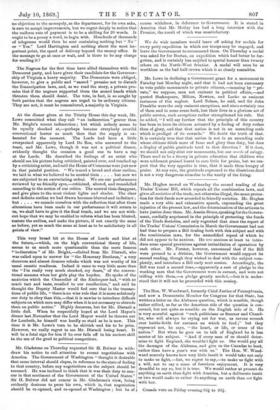Mr. Lowe in declining a Government grant for a monument
to Faraday last Monday night, said that it had not been customary to vote public monuments to private citizens,—meaning by "pri- vate," we suppose, men not eminent in political affairs,—and quoted Shakespeare, Milton, Newton, and Locke as eminent instances of this neglect. Lord Nelson, he said, and Sir John Franklin were the only eminent exceptions, and since certainly one of them and in some sense both, lost their lives in a glorious act of public service, such exceptions rather strengthened his rule. But he added, "I will say further that the principle of this country has been to have its citizens actuated by a feeling of duty rather than of glory, and that that nation is not in an ascending scale which is prodigal of its rewards." We doubt the truth of that. It is certainly true that that nation is not in an ascending scale whose citizens think more of fame and glory than duty, but does a display of public gratitude tend in that direction ? If it does, we should not only stint our monuments, but our words of eulogy. There used to be a theory in private education that children who were seldomest praised learnt to care little for praise, but we sus- pect that the very opposite is true, that it made them hungry of praise. At any rate, the gratitude expressed to the illustrious dead is not a very dangerous stimulus to the vanity of the living.






























 Previous page
Previous page